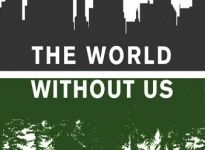

"Alan Weisman offers us a sketch of where we stand as a species that is both illuminating and terrifying. Times" Book Prize-winning "The Whale and the Supercomputer" This is a text that has a chance to change people, and so make a real difference for the planet."-Charles Wohlforth, author of "L.A. "This is one of the grandest thought experiments of our time, a tremendous feat of imaginative reporting!"-Bill McKibben, author of "The End of Nature" and Deep" Economy: The Wealth of Communities and The Durable Future" "The imaginative power of "The World Without Us" is compulsive and nearly hypnotic-make sure you have time to be kidnapped into Alan Weisman's alternative world before you sit down with the book, because you won't soon return. It is narrative nonfiction at its finest, and in posing an irresistible concept with both gravity and a highly readable touch, it looks deeply at our effects on the planet in a way that no other book has. As he shows which human devastations are indelible, and which examples of our highest art and culture would endure longest, Weisman's narrative ultimately drives toward a radical but persuasive solution that needn't depend on our demise. From places already devoid of humans (a last fragment of primeval European forest the Korean DMZ Chernobyl), Weisman reveals Earth's tremendous capacity for self-healing.

Drawing on the expertise of engineers, atmospheric scientists, art conservators, zoologists, oil refiners, marine biologists, astrophysicists, religious leaders from rabbis to the Dali Lama, and paleontologists-who describe a prehuman world inhabited by megafauna like giant sloths that stood taller than mammoths-Weisman illustrates what the planet might be like today, if not for us. It describes the distinct ways that organic and chemically treated farms would revert to wild, how billions more birds would flourish, and how cockroaches in unheated cities would perish without us.

"The World Without Us "reveals how, just days after humans disappear, floods in New York's subways would start eroding the city's foundations, and how, as the world's cities crumble, asphalt jungles would give way to real ones. In this far-reaching narrative, Weisman explains how our massive infrastructure would collapse and finally vanish without human presence which everyday items may become immortalized as fossils how copper pipes and wiring would be crushed into mere seams of reddish rock why some of our earliest buildings might be the last architecture left and how plastic, bronze sculpture, radio waves, and some man-made molecules may be our most lasting gifts to the universe. In" The World Without Us, "Alan Weisman offers an utterly original approach to questions of humanity's impact on the planet: he asks us to envision our Earth, without us. "A penetrating, page-turning tour of a post-human Earth"


 0 kommentar(er)
0 kommentar(er)
